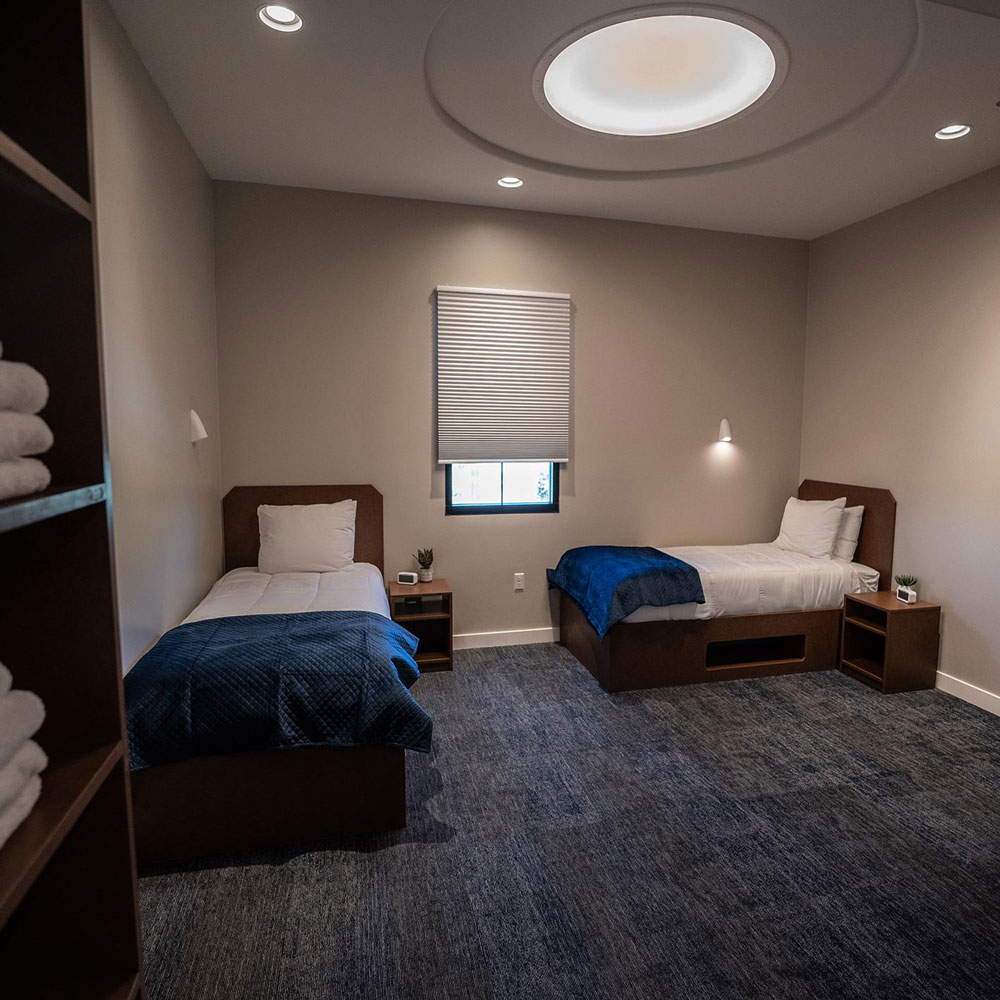By Alanna Hilbink
Everyone who enters treatment, whether for mental health or substance use issues, comes in at different points of need. Some find recovery early, through regular therapy sessions or outpatient programs. Some have a higher acuity level and benefit more from inpatient or more intensive residential treatment. And some who dysregulated may need an additional level of support before they get started: stabilization. This helps get them to a point where they are prepared to make the most of the treatment process. Mental health and addiction are so closely related that no matter which of these scenarios you or your loved one fall into, you are never alone.
In Navigating a Mental Health Crisis, the National Alliance on Mental Illness (NAMI) shares that one in five Americans experiences mental illness each year. That’s 43.8 million people or 18.5% of the adult population. Additionally, it reports, “Among the 20.2 million adults who experienced a substance use condition, 50.5% (10.2 million adults) had a co-occurring mental illness.”
So if you are struggling to find balance or are experiencing a mental health crisis and need addiction treatment, you have some great options for healing. For those who need to gain some regulation skills prior to beginning treatment, they can start their recovery journey with mental health stabilization.
Who Needs Mental Health Stabilization?
Anyone experiencing a mental health crisis or warning signs of a mental health crisis needs immediate support and stabilization. NAMI defines a mental health crisis as “any situation in which a person’s behavior puts them at risk of hurting themselves or others and/or prevents them from being able to care for themselves or function effectively in the community.”
So how do you know if you or a loved one needs mental health stabilization? Signs and symptoms of a crisis can include the following:
- Self-isolation or inability to care for your health and hygiene
- Mood swings or rapid changes in energy level
- Verbal threats, physical threats, or violence toward property
- Verbal or physical abuse to yourself or others
- Paranoia or losing touch with reality: confusion, hearing or seeing things that aren’t there, inability to recognize family or friends
- Suicidal thoughts or actions
If you are already diagnosed with a mental health disorder like depression, bipolar disorder, or other personality disorders, you’re more likely to need stabilization at some point in your life.
These symptoms can be caused by life events, mental health, and substance use. If you are already diagnosed with a mental health disorder like depression, bipolar disorder, or other personality disorders, you’re more likely to need stabilization at some point in your life. But you may also find that more extreme mental health symptoms appear even if you’ve never struggled with your mental health before, especially if you’re using drugs or alcohol. And these symptoms can get in the way of your ability to succeed in an addiction recovery program if you don’t first have the mental stability needed to focus and engage.
Some mental health crises may require emergency or ER attention during your admission to a stabilization program like that at Spero Center at The Meadows. But you don’t have to wait for extremes before taking action in a mental health crisis. As the Substance Abuse and Mental Health Services Administration (SAMHSA) emphasizes, “Crisis services are for anyone, anywhere, and anytime.”
You or someone you care about may be experiencing psychosis or suicidal thoughts, or you may simply feel that your baseline is off, that life feels a bit shaky beneath your feet. No matter who you are or what your struggle may be, if you want to find recovery but don’t feel like your mental health is balanced enough, understanding what stabilization is and how you can benefit from it is key.
What Is Stabilization?

Before you can really benefit from addiction or mental health treatment, physical stabilization and mental balance are needed. A format like Spero’s Sky Program offers short-term stabilization that usually lasts seven days or less, to help you take your next step toward wellness. This does not include in-depth treatment for mental health or addiction issues but rather prepares the individual for that process.
Your stabilization will most likely involve receiving and adjusting to any needed medications. It will include guidance in gaining skills and tools for self-regulation. You’ll meet with a psychiatric provider, participate in daily groups, and engage in light clinical work such as dialectical behavior therapy, cognitive behavioral therapy, and holistic practices like art and yoga. However, the focus in a stabilization program is not on these treatment modalities; the focus is on providing regulation tools and time in a safe and secure environment to find balance and become ready for further treatment.
After completing short-term stabilization, you’ll have the focus you need to fully benefit from a long-term mental health and addiction treatment program. These programs will then take a deeper look at the why behind your substance use and provide tools for maintaining your developing stability and recovery.
Where Should I Go for Stabilization, Treatment, and Recovery?
No matter where your journey to recovery needs to start, the fact that you’re beginning it is reason for celebration. We encourage you to reach out to us at Spero Center at The Meadows to learn more about our program and your options. Our admissions specialists will listen to your individual, unique needs and match you to the best services for you or your loved one, from stabilization to any and all continued treatment.
While we offer an array of treatment types and locations to meet many unique recovery needs, we are also more than happy to connect you to non-Meadows programs after stabilization if they are a better fit for your recovery goals. We are here to make the treatment process as simple and seamless as possible, and to give you the helping hand you need now to lay the groundwork for a lifetime of recovery.
